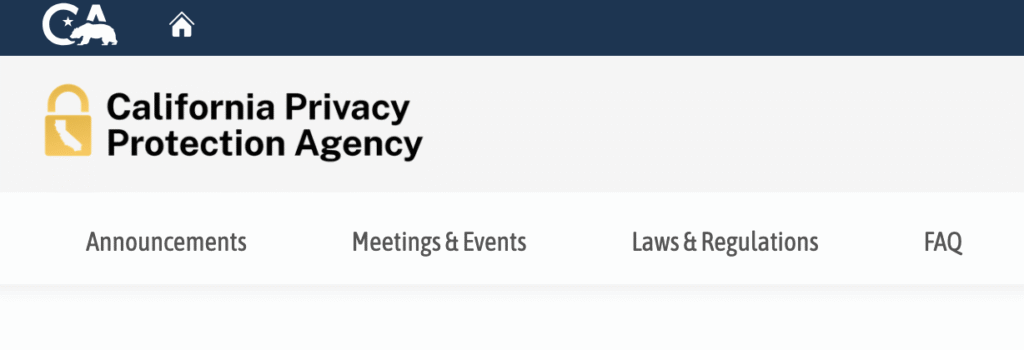
An announcement about the recent expansion of the Consortium of Privacy Regulators with the addition of Minnesota and New Hampshire from the California Privacy Protection Authority. This bipartisan initiative, now comprising ten states, underscores a unified commitment to harmonizing enforcement efforts under comprehensive privacy laws. Announced in October of 2025 by the California Privacy Protection Agency (CPPA), the inclusion of these states follows their enactment of robust data privacy statutes in 2024, which took effect in 2025 and enforcement has been ramping up ever since. From my vantage point in regulatory oversight, this growth signals a maturing national framework that amplifies our collective ability to protect individuals while holding businesses accountable, without the fragmentation that has plagued prior state-level approaches.
Business owners are now being forced to comply by both regulators and litigators. The solution is to book a demo with a Captain Compliance privacy expert and see how to automate these requirements.
Background on the Consortium of Privacy Regulators
Launched in April 2025 as a collaborative platform, the Consortium brings together state attorneys general and privacy agencies to streamline the implementation and enforcement of privacy legislation. Its core mission revolves around sharing expertise, resources, and investigative leads to address cross-jurisdictional violations efficiently. Participating states share foundational legal elements in their privacy acts, such as consumer entitlements to access, correct, delete personal information, and opt out of data sales or targeted advertising. These commonalities facilitate coordinated actions, ensuring that enforcement remains consistent and effective nationwide.
Prior to this expansion, the group included California, Colorado, Connecticut, Delaware, Indiana, New Jersey, and Oregon. The Consortium convenes regular meetings to align strategies, particularly on high-impact issues like data broker compliance and algorithmic profiling. Such forums are invaluable for pooling intelligence and avoiding duplicative efforts, ultimately conserving public resources while maximizing consumer safeguards.
Key Developments with Minnesota and New Hampshire’s Entry
Minnesota’s Consumer Data Privacy Act and New Hampshire’s Data Privacy Act, both legislated in 2024, empower residents with proactive controls over their personal data, mirroring protections in other member states. This alignment prompted their swift integration into the Consortium, elevating its membership to ten. New Hampshire’s Attorney General John M. Formella established a dedicated Data Privacy Unit earlier this year to bolster compliance monitoring, while Minnesota’s Attorney General Keith Ellison has augmented his Consumer Protection Division with additional legal staff and investigators.
From an enforcement perspective, these enhancements are timely. The CPPA’s recent actions, including multimillion-dollar settlements with entities like Tractor Supply Company and American Honda Motor Co. for violations of California’s Consumer Privacy Act, demonstrate the tangible benefits of proactive regulation. The Consortium’s framework now enables similar rigor across borders, as outlined in the following coordinated enforcement principles:
- Information Sharing: Members exchange non-public investigative data to identify patterns of non-compliance, such as widespread data broker failures, accelerating multi-state probes.
- Joint Investigations: Collaborative probes into major breaches or deceptive practices, leveraging combined expertise to build ironclad cases.
- Harmonized Guidance: Development of uniform advisory documents on emerging issues, like AI-driven data processing, to guide businesses toward voluntary compliance.
- Resource Allocation: Prioritizing high-risk sectors, including finance and health tech, through shared risk assessments.
Michael Macko, CPPA’s head of enforcement, emphasized this momentum: “We look forward to collaborating with Minnesota, New Hampshire, and states nationwide as we continue growing our collective privacy enforcement apparatus.” Similarly, CPPA Executive Director Tom Kemp affirmed, “Collaboration with states across the country makes it easier for us to protect Californians.”
Implications for Nationwide Privacy Governance
This expansion heralds a new era of scalable enforcement, where state regulators like myself can transcend silos to tackle systemic threats. By fostering bipartisanship, the Consortium mitigates political volatility, ensuring sustained progress amid federal inaction. Businesses operating multistate will benefit from clearer, unified expectations, reducing compliance costs through predictable standards. For consumers, it translates to swifter remedies against abuses, from unauthorized data sales to inadequate security measures.
Key strategic advantages include:
- Enhanced Deterrence: Coordinated penalties amplify financial disincentives for violators, as seen in CPPA’s sweep against unregistered data brokers, which yielded over half a dozen enforcement wins.
- Innovation Safeguards: Balanced oversight promotes ethical data use in emerging technologies, such as generative AI, without stifling growth.
- Equity Focus: Targeted protections for vulnerable populations, including opt-outs for sensitive data categories like health and biometric information.
- Global Synergies: Building on CPPA’s partnerships with counterparts in Korea, France, and the United Kingdom, the Consortium positions U.S. states as leaders in international data flows.
- Public Education: Joint campaigns to raise awareness of rights, empowering individuals to exercise opt-outs and access requests effectively.
Conclusion
The Consortium’s growth to ten states, with Minnesota and New Hampshire’s pivotal contributions, exemplifies regulatory ingenuity in service of public trust. As an enforcement regulator, I am optimistic that this model will inspire further accessions, culminating in a robust national privacy ecosystem. Stakeholders should seize this opportunity to audit practices and engage in dialogue, fortifying defenses against evolving digital risks. For regulators, it reaffirms our mandate: vigilant, collaborative stewardship of privacy as a cornerstone of democratic society.
References
California Privacy Protection Agency. (2025, October 8). Minnesota and New Hampshire join bipartisan consortium as privacy collaboration continues growing nationwide. https://cppa.ca.gov/announcements/2025/20251008.html
National Law Review. (2025, October 9). Breaking: Minnesota and New Hampshire join bipartisan consortium of privacy regulators. https://natlawreview.com/article/breaking-minnesota-and-new-hampshire-join-bipartisan-consortium-privacy-regulators
VitalLaw. (2025, October 9). Minnesota, New Hampshire join state privacy regulators’ consortium. https://www.vitallaw.com/news/minnesota-new-hampshire-join-state-privacy-regulators-consortium/cspd018cd6972b92db447f9690295f268b3ffd
Bloomberg Law. (2025, October 8). Minnesota, New Hampshire join privacy enforcement coalition. https://news.bloomberglaw.com/privacy-and-data-security/minnesota-new-hampshire-join-privacy-enforcement-coalition